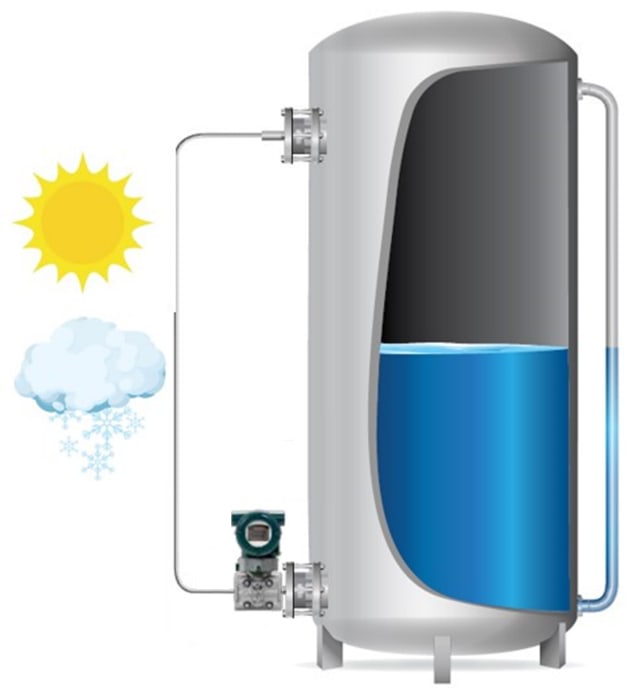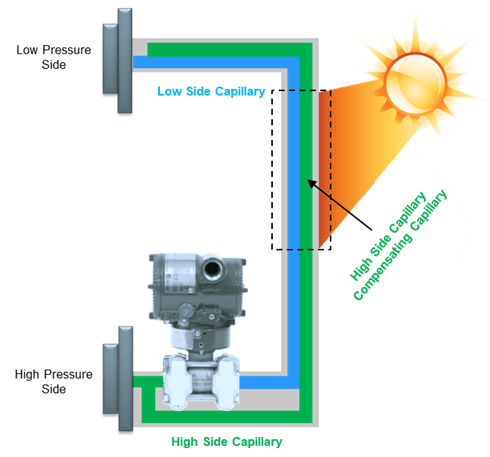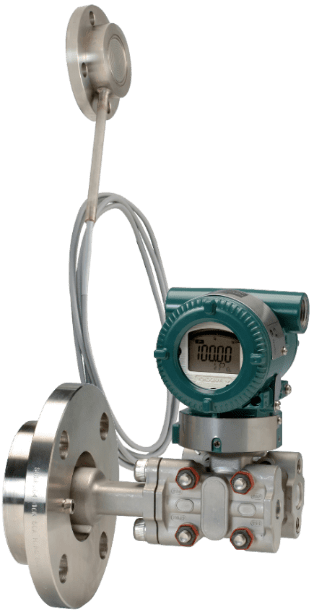Ideal for various tank and vessel level measurements, diaphragm seal systems with compensating capillaries set a new standard for high performance, safety, and reliability.
 Throughout process industries including chemicals, petrochemicals, plastics, pulp & paper, and refining, storage tanks are widely used to hold feedstocks and final products. Tanks are highly specialized. Designed specifically with the safety and preservation of a particular chemical in mind, they are kept as cool and dry as possible to prevent spoilage and safety risks.
Throughout process industries including chemicals, petrochemicals, plastics, pulp & paper, and refining, storage tanks are widely used to hold feedstocks and final products. Tanks are highly specialized. Designed specifically with the safety and preservation of a particular chemical in mind, they are kept as cool and dry as possible to prevent spoilage and safety risks.
Since storage tank sizes vary widely by process and material, a large portion are installed outdoors and, therefore, exposed to ambient conditions. In locations such as the Texas panhandle, the daily temperature in the spring could vary by 30°F. During the winter, a cold front can bring a 50° temperature swing in a matter of hours. Incorrect level measurement due to changes in ambient or process temperature can cause the tank to overflow, leading to safety hazards, lost product, inventory control problems, environmental contamination, and damage to process equipment such as pumps.
Challenges
Differential pressure (DP) level measurement is among the most common methods to determine the quantity of chemicals or raw materials inside a tank. Accurate quantification simply requires DP and the density. However, for tanks located outdoors, ambient temperature conditions can interfere with the level measurement due to the expansion and contraction of oil inside capillary tubes that are connected to diaphragm seals.
Solution
Yokogawa has designed the EJXC80A Diaphragm Seal System with a unique compensating capillary specifically to address this issue. The compensating capillary is an additional capillary tube on the high-pressure side of the transmitter that balances the volume of fill fluid with the capillary on the low-pressure side. This allows both the high and low side fill fluids to be exposed to the same conditions and reduce errors caused by changes in ambient temperature. By reducing variability in-tank measurements, chemical storage capacity can be increased and operators can better manage production targets. In addition, there is no need to perform manual checks to confirm tank levels and periodically re-zero the transmitter.
 Key Advantages
Key Advantages
- Eliminating re-zeroing and manual check requirements reduce maintenance OPEX costs.
- Stable measurement leads to increased storage capacity, improved production management, and improved profitability.
- Reducing the risk of tank overflows reduces risks in terms of process downtime, inventory management problems, environmental contamination incidents, and safety compliance.
Industries
-
Chemical
Chemical plants rely on continuous and batch production processes, each posing different requirements for a control system. A continuous process calls for a robust and stable control system that will not fail and cause the shutdown of a production line, whereas the emphasis with a batch process is on having a control system that allows great flexibility in making adjustments to formulas, procedures, and the like. Both kinds of systems need to be managed in available quality history of product, and to be able to execute non-routine operations. With its extensive product portfolio, experienced systems engineers, and global sales and service network, Yokogawa has a solution for every plant process.
-
Food & Beverage
The food and beverage industry must produce safe, high-quality foods and beverages for consumers. In addition to quality control, the manufacturing processes include many challenges such as managing ingredients, improving efficiency and handling global environmental issues. Yokogawa leverages its decades of technological expertise to help customers build and operate the ideal factory.
-
Pulp & Paper
The paper and pulp industry is highly competitive and must meet ever-changing market needs. Yokogawa helps realize energy-efficient plants which are globally sustainable.
-
Refining
In the ever-changing marketplace, refineries are seen not only as crude processing units but also as profit centers. At the same time, there is a keen awareness of the need for safety at such facilities. A total production solution that encompasses planning, scheduling, management, and control is required to achieve long-term goals for profitability, efficiency, and environmental protection. With years of expertise in the automation field, Yokogawa can bring you affordable total solutions for improved operability and a cleaner world.
Related Products & Solutions
-
EJXC80A, EJAC80E (Differential / Gauge Pressure Diaphragm Seal)
Differential / Gauge Pressure Diaphragm Seal System with one or two Diaphragm Seals
-
EJXC80A, EJAC80E (Differential Pressure Direct Mounted Seal)
Differential Pressure Direct Mounted Seal
-
Diaphragm Seal System
Protect transmitters’ pressure-sensing assemblies with field-proven diaphragm seal solutions.
Have Questions?
Contact a Yokogawa Expert to learn how we can help you solve your challenges.